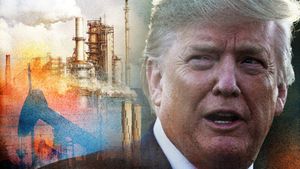Throughout political history, few moments have left as lasting of an impression as the infamous White House Correspondents' Association Dinner of 2011. This event not only illustrated the stark differences between President Barack Obama and business mogul Donald Trump but also ignited fuel for what would become Trump's burning desire for political power. With Michelle Obama standing by, the comedic roast delivered by President Obama struck chords deep within Trump’s psyche, twisting his public persona and political ambitions.
At this star-studded gala, President Obama took it upon himself to poke fun at Trump, who was attending as part of the wealthy elite. “Donald Trump is here tonight,” Obama said, smirking. “I know he’s taken some flack lately, but no one is happier to put this birth certificate matter to rest than The Donald.” With those words, the audience erupted with laughter. The remark was not merely jest; it was part of a longer roast targeting Trump’s previous insistence on the “birther” conspiracy—the claim questioning Obama’s eligibility to be president due to alleged discrepancies surrounding his birth certificate.
Trump, red-faced and visibly perturbed, sat through the relentless onslaught. President Obama continued, “Say what you will about Mr. Trump, he would certainly bring some change to the White House.” This punchline was followed by mock visuals featuring Trump’s properties transformed whimsically, reimagined as extravagant hotels and casinos—a corresponding jab at Trump’s identity as the embodiment of luxury.
It became increasingly clear during the dinner: Trump was the butt of the joke, and Obama was the spirited comedian wielding the punches. Some observers later suggested it was precisely this public humiliation amid the elite class, rallying laughter over Trump’s stature, which irrevocably altered the course of his political aspirations. Reports indicated Trump's decision to run for president was, at least partially, shaped by this night of mockery.
Over the years leading up to his presidential campaign announcement, Trump's public persona oscillated between admiration and contempt for the Obamas. For some time, he regarded Obama as “a very capable guy.” Trump described Obama’s public speaking skills as impressive, lauding him as someone who could deliver great performances regardless of background. Yet underneath this cordial exterior lay resentment. Upon Obama's elevation to the presidency, Trump sprang forth with his notorious birther claims.
According to Trump's former lawyer Michael Cohen, Trump had developed deep-seated animosity toward Obama, transgressing mere political rivalry. Cohen’s memoir depicts how Trump disparaged Obama as “a Manchurian candidate” and implied his success stemmed from affirmative action rather than merit. The escalation grew sharper through time, especially after the 2011 dinner incident when Trump felt he had been insulted on such grand ground.
Fast forward to 2015, and Trump began initiating his campaign for the presidency with considerable fervor. After dramatically gliding down his golden escalator at Trump Tower, he revealed his intentions to run. Within the following months, he unleashed on Obama with relentless criticism. Trump branded him “the most ignorant president,” labelled his presidency as disastrous, and even labeled Obama as “the founder of ISIS.”
Such inflammatory rhetoric seemed to rally support from his base—individuals attracted to his blunt, candid style. The stark juxtaposition between Trump's brash tone and Obama’s stoic demeanor enthralled many conservative voters, who felt misrepresented under the previous administration. Trump tapped directly on the fears and discomforts of this group, amplifying their grievances through his words—it became his rallying cry.
Yet it wasn't just mere insults lobbed at Obama—Trump's remarks about Michelle Obama took the narrative to another level. During one of his rallies, he asserted, “You know who was nasty to me? Michelle Obama,” drawing boos from the crowd. Trump doubled down by implying she had “opened up a little bit of box,” inadvertently showcasing his grudge against her. All this talk certainly suggested Trump felt personally affronted, not just politically challenged.
But why this resentment? For Trump, Michelle Obama represented the refined, distinguished, and sophisticated first lady—everything his public persona seemed antithetical to. By contrasting his boisterous style with her classy demeanor, Trump appeared to feed on his self-image as the brash disruptor of political norms, amplifying disdain for figures who exuded grace and respect as she did.
Trump’s claim he had “always tried to be nice and respectful” toward the Obamas seemed more pointedly ironic considering his long history of disparagement, particularly aimed at both Michelle and Barack. His version of niceness seemed convoluted; it was built on layers of public insults veiled as humor or critiques—an indication of his conflicting feelings toward the Obamas.
The animosity and subsequent entrenchment manifested themselves vigorously throughout Trump's political career. From alarming accusations to inflammatory comments, their feud spiraled beyond traditional political contest, launching numerous skirmishes across social media and public statements. The Obamas have continued to stay largely above the fray, engaging occasionally yet seeking to deflect the heated jabs with dignity and composure.
While Trump’s campaign emerged amid extensive media coverage and controversies, his focus on Michelle Obama representing the elite's educated voices became integral to his narrative. Trump has often marketed himself as the outsider battling against established influences, which he associates with the expression and resulting efforts of figures like Michelle Obama.
The psychological framework set at the dinner has been deeply impactful. Trump revels not just at spotlighting his opposition but also at framing himself through counterbalancing their profiles. His continuing emphasis on Michelle Obama speaks volumes—both about his perception and the legacy he crafts through his rhetoric.
Referring back to the height of this political grudge, the questions arise: What drives such intense opposition? Is it the nostalgia of feelings toward political slights? Or perhaps, does it speak to the political lengths to which one would go—transforming simple conflict of opinions to knowledgeable plays for power? Either way, Trump’s engagement with the Obama family has evolved from mere political rivalry to personal vendetta, signifying how deeply intertwined the personal and political realms can be.



